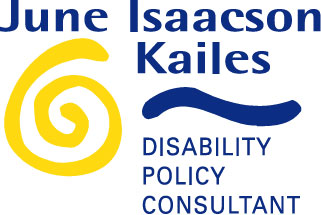

Many foundational resources, papers, and tools created by June Isaacson Kailes over the past decades are preserved on this site, which serves as a historical archive. For new and updated content, visit junekailes.com. Effective 12/12/25.
June
is well known for her pioneering work. She was part of less
than a handful of people with disabilities who focused on emergency
issues
decades before Hurricane Katrina. As far back as the 1970s and 80s,
June
documented the profound and dramatic lack of equal and inclusionary
emergency
services for people with disabilities.
She
has
worked nationally with FEMA, the Centers for Disease Control, the
Department of
Homeland Security, and Health and Human Services on policy, planning,
and
training issues. For example, she co-chaired The United States
Department of
Homeland Security’s working group, which developed a Functional and
Medical
Support Sheltering Target Capabilities List, worked on FEMA’s
Guidance on
Planning for Integration of Functional
Needs Support
Services in General Population Shelters ,
and was a nine year member
of FEMA’s National Advisory Council.
Examples
of
her impact and influence in emergency services include:
1. Two
widely used and cited after-action reports: “Southern
California Wildfires After Action
Report”
and Getting It
Wrong: An
Indictment with a Blueprint for Getting It Right, Disability Rights,
Obligations and Responsibilities Before, During and After Disasters.
2. Developing
inclusive emergency
management plans that emphasize and incorporate standard operating
procedures, field operation guides, just-in-time checklists, and
exercises.
3.
Conceiving, promoting, and moving the
emergency management from the vague “special needs” focus to
operationalizing
an access and functional
needs approach to
planning, response, and recovery. This fosters a clearer
understanding of who is included in the large numbers and diversity of
people
with disabilities and others with access and functional needs.
June’s CMIST
is a memory tool that helps to remember and plan for the five
functional needs that individuals will likely have in an emergency:
communication; maintaining health; independence; support, safety, and
self-determination; and transportation.
CMIST
offers clarity, precision, and specificity
for building inclusive planning and service practices. Emergency plans
based on
optimizing function rather than “specialness” increase the chance of
accommodating predictable needs successfully.
4. Originating
and working with the State of California to
adopt and implement Functional
Assistance Service Teams (FAST).
These teams strategically link government, disability-led, and
disability-focused organizations, and business sectors to work
with
individuals with access and functional needs to help
people maintain
mobility, health, safety, independence during and after
emergencies. Teams
blend the competencies and skillsets of governments with community
disability
service workers. Teams help retool interventions that reflect old, but
still
common, stigmatizing biases, stereotypes, and beliefs about people with
disabilities. Variations of this model are being customized put
into
practice in other states and counties.
5. Documenting
the critical
need to accurately evaluate the use of emergency
registries and
to
avoid symbolic
planning (i.e.,
planning that cannot be fully operationalized to achieve even the most
well-intentioned objectives.)
Some
of June's often used and cited publications include:
Planning
and response:
Preparedness:
In
emergencies, people with disabilities continue to lose their
health, independence, and sometimes their lives. This loss is because
information transfer regarding these predictable needs over decades,
and
lessons observed, relayed, and documented are not integrated into
plans,
policies, procedures, training, and exercises. June’s work focuses on
consistently and repeatedly applying these lessons to be eventually
claimed as
lessons learned.
June
believes the emergency sector’s performance depends on resilience
and flexibility to evolve as economic, learning, technology, legal, and
social
landscapes change. As a critical thinker and lifelong learner, she
never
hesitates to critic and revise her work, so check http://www.jik.com/mrp.html for
current
editions of her materials.

Available on
request

 jik@pacbell.net
jik@pacbell.net
© 1998 - 2022 June Isaacson
Kailes, Disability Policy Consultant, All Rights Reserved.
Created 11/8/97
| Updated 1.2.22